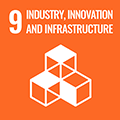Queen’s University researchers are working to deliver the next generation of nano-photonic devices in partnership with Seagate Technologies in an initiative that is driving significant inward investment to Northern Ireland.
The partnership has led to the creation of the Smart Nano NI Consortium which has been awarded over £60m to develop new technology for medical devices, communication and data storage.
Research Challenge
DELIVERING THE NEXT GENERATION OF NANO-PHOTONIC DEVICES
Photonics is at the centre of a global technological advance. While the last 60 years has been driven by electronics, the 21st century has been revolutionized by how we harness and exploit light though photonics.
Working alongside Seagate Technologies and other industry partners, researchers at Queen’s are creating ground-breaking nano-photonics devices and establishing a supply chain for these devices into healthcare, optical communications and data storage sectors.
Our Approach
AN INDUSTRY LED CONSORTIUM WITH EXPERTISE IN PHOTONICS AND NANO-TECHNOLOGY
Materials physics research at Queen’s has driven the emergence of a research-driven, tech-based ecosystem in Northern Ireland.
Queen’s researchers, in partnership with the Smart Nano NI Consortium are accelerating the work of developing transformative advanced prototyping and smart manufacturing methods. This will allow for the delivery of new technologies to develop sensors for healthcare and optical communications. The Consortium will build capacity and new prototypes in the spheres of medical devices, communication, and data storage.
Lead researcher, Professor Robert Boman explains “Our work involves materials engineering of photonic components at the microscopic level. Imagine small Lego blocks but hundreds or thousands times smaller, with different functions, combining several together to make a device; but then then doing it in batches of hundreds, then doing thousands at a time on wafers. Smart manufacturing procedures will enable these devices reach into many applications.”
Watch: Smart Nano NI Consortium
“The benefits of this work will extend far beyond the consortium partners through productivity growth and the attraction of foreign investment”.
- Professor Nola Hewitt-Dundas
What impact did it make?
CREATING NEW JOBS, NEW COMPANIES AND NEW PRODUCTS
Smart Nano NI promises to be a major opportunity for the UK and for advanced manufacturing in Northern Ireland.
Northern Ireland has a unique cluster of expertise in this globally expanding field. The collaboration will enable the establishment of a Centre of Excellence that will drive advances in the Life and Health Sciences as well as exploiting the potential of photonics and nanotech in other high-growth sectors through knowledge transfer.
The project offers a step-change in advanced manufacturing. Smart nano manufacturing acts as a platform technology to create new opportunities for business innovation, improving existing products, generating new products and enabling firms to enter new markets. The benefits of this work will extend far beyond the consortium partners through productivity growth and the attraction of foreign investment.
The collaboration presents benefits and opportunities on multiple fronts. It is estimated that the project could lead to the creation of over 500 jobs, a £250m increase in exports and the injection of around £100m in Foreign Direct Investment over the next 10 years.
Our impact
Impact related to the UN Sustainable Development Goals
Learn more about Queen’s University’s commitment to nurturing a culture of sustainability and achieving the Sustainable Development Goals (SDGs) through research and education.










